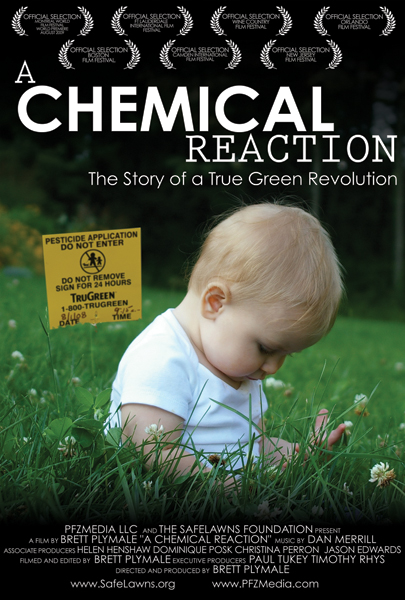 A Chemical Reaction, a film that tackles the dangers of yard pesticides, makes its main point very early: These products are designed to kill living things, so why are we so surprised when they make humans—who also happen to be living things—sick? Once that argument is made, images of kids wrestling in green grass and dogs relaxing on pristine lawns take on new meaning.
A Chemical Reaction, a film that tackles the dangers of yard pesticides, makes its main point very early: These products are designed to kill living things, so why are we so surprised when they make humans—who also happen to be living things—sick? Once that argument is made, images of kids wrestling in green grass and dogs relaxing on pristine lawns take on new meaning.
Director Brett Plymale’s film focuses on the small town of Hudson, Quebec, where the activism of one eccentric doctor led to a ban on the use of chemical pesticides and herbicides on public and private green spaces. Dr. June Irwin is a dermatologist who first noticed the connection between her patients’ health and their exposure to these chemicals way back in 1984. She is definitely a character—she lives with her sheep and seems to have an addiction to eye shadow—but eventually the force of her argument made its way through the city council, leading to the ban. An inevitable legal battle ensues, spearheaded by powerful corporate forces.
The film’s narrator is Maine resident Paul Tukey, a landscaper who fell ill and attributes his malady to the fact that he practically swam in pesticides every spring. Tukey has become an impassioned advocate for aggressive action to ban these products in the U.S. (Yet again our country seems to be lagging behind other developed nations.) In one of the film’s more heartbreaking moments, Tukey discusses the possibility that his chemical exposure might have impacted his son’s development of ADHD. As one doctor put it: these products kill cells, and, upon entering the body, they’ll do just that, even in the human brain.
Needless to say, the pesticide companies don’t come off very well in A Chemical Reaction. One of the film’s most amusing sections features a montage of commercials for lawn treatments—who knew dandelions were so darn evil?
As the camera lingers on the beautiful lawns and well-kept sports fields of Hudson—chemical free since 1991—simple questions emerge: Why are we dumping poison on our homes? Isn’t there a better way?
For more information, visit pfzmedia.com.


